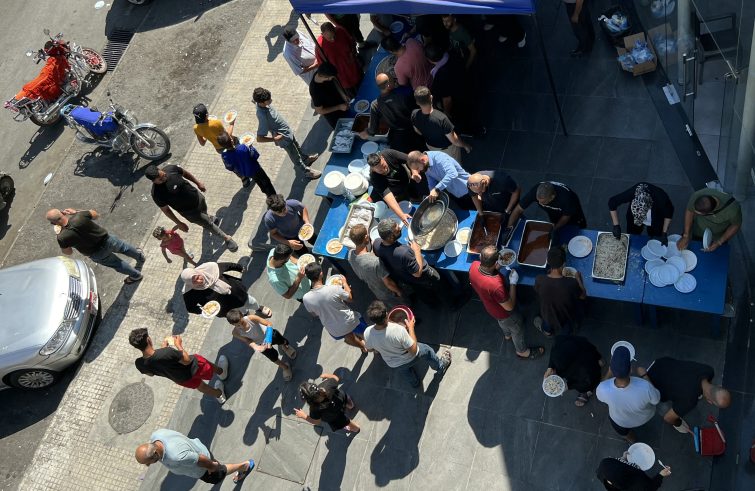
At night, lit by bomb blasts and the haunting sound of destruction, Marianne, a Lebanese engineer and mother of four, braces herself for a new dawn of questions. “Did you get any sleep? What happened during the night?” This is how the day begins in this Christian neighbourhood of Beirut and in Marianne’s house since 24 September, when the Israeli government launched an attack on the Hezbollah militia in southern Lebanon, determined to uproot its leaders, as it had tried to do with Hamas in the Gaza Strip. The radio news programme in Marianne’s home does not report on the strategic plans of the war, but on the shocking number of dead and wounded. Added to this are the numbers of collateral victims: the goats, the cows, the sheep and the forests that have been affected. Next come the names of affected villages and hamlets, their distance and the travel time taking shape in the engineer’s mind: 20 kilometres from home, 45 kilometres, half an hour, 15 minutes. In Lebanon, everything is too small, too close. “Beirut’s southern suburbs hit,” a news report says, and Marianne knows it’s only a ten-minute drive from home.
The young mother makes herself some coffee, thanks to the electricity generated in solar power stations installed three years ago in her neighbourhood at the height of the fuel crisis. It’s the only time she has to herself before her children arrive with a torrent of questions: “Are the schools open? No.” Followed by: “Can we go out? Not today.” Finally, “Do we have to stay home?” And when Marianne nods to confirm, the most dreaded question is asked: “Why?”
How can you explain to a child under ten why a war is being waged that does not even spare its innocents? How can one expect their young hearts and minds to understand that bomb after bomb, built with the same state-of-the-art technology used by their mother uses for her work, is destroying part of their country? How do you explain to them that the artificial intelligence that their mother is doing her PhD on is deciding the targets and the successes, oblivious to the death and destruction? As the attacks continue to escalate, more questions arise. “Where is your brother?” Marianne asks her youngest son. He replies: “When is daddy coming back from his recent business trip?” These have been days of questions gnawing at the Lebanese woman’s life, as she and her husband struggle to hold on and not leave the country again. “Where should we go?” she wonders. It’s a question faced by many of her neighbours who have chosen to stay in the fear that their homes could be occupied by the military or militants who, once inside, might never leave, as has happened to so many Palestinian refugees in the country. “Should we just pack our belongings and leave? Should we just leave the region or the country? What about the school? We just bought the children’s textbooks. Our youngest daughter hasn’t even started first grade yet.” Marianne’s head is spinning, as she braces for the possibility that everything will come to an end, including her job.
The rocket attacks continue, despite international warnings, the escalation of the conflict, Iran’s response, and the likelihood of further fatalities among Lebanese civilians. For the rest of the world, these casualties will be perceived as Hezbollah militants, even though that is not the reality on the ground. As the bombing rages on, thoughts turn to the grandparents.
Thoughts go to the uncle abroad, who is bombarded with bad news and the latest updates on the numbers of dead and wounded – until the news confirms that this time it is a friend’s village that is being bombed. “What could have happened to him?” “Is he still alive?” “Whose turn will it be next time?” Most of the inhabitants of the region are Christian, Marianne says, “although they coexist with hundreds of Syrian Muslim refugees distributed throughout the area due to the decade-long crisis.” This area of the country is considered to be relatively safe, “though it is impossible to predict what the warfare apparatus and the drones are searching for.” Children are not going to school. Tennis lessons are suspended. Outdoor life has been confined to the domestic sphere, where people play with their pets, prepare pancakes, argue and reconcile, uncertain as to when the final word will prevail over this state of uncertainty. As the children press her with their questions, Marianne attempts to deflect the answers, especially those she should provide to her eldest son. “He studies human rights, but he quickly realised that those rights are not the same for all peoples, and he looks at the future of the country and his own with countless questions” to which she, as a mother, has no answer and has to concede: “I don’t know.” Marianne draws on her religious beliefs: “God will guide us; this I firmly believe. He will guide us through this tragedy, as He did in the past.” She starts reciting prayers of supplication to God and the Virgin Mary in her mother tongue, wondering once again if this is where her faith comes from. It is faith that “makes us hold on, even when we have nothing, trusting that evil will not have the last word and that God’s justice will prevail,” the young Lebanese woman concludes, returning to her daily routine, where sadness, anger, confusion, hope blend together with unending questions regarding the day when this umpteenth war with Israel will finally come to an end.











